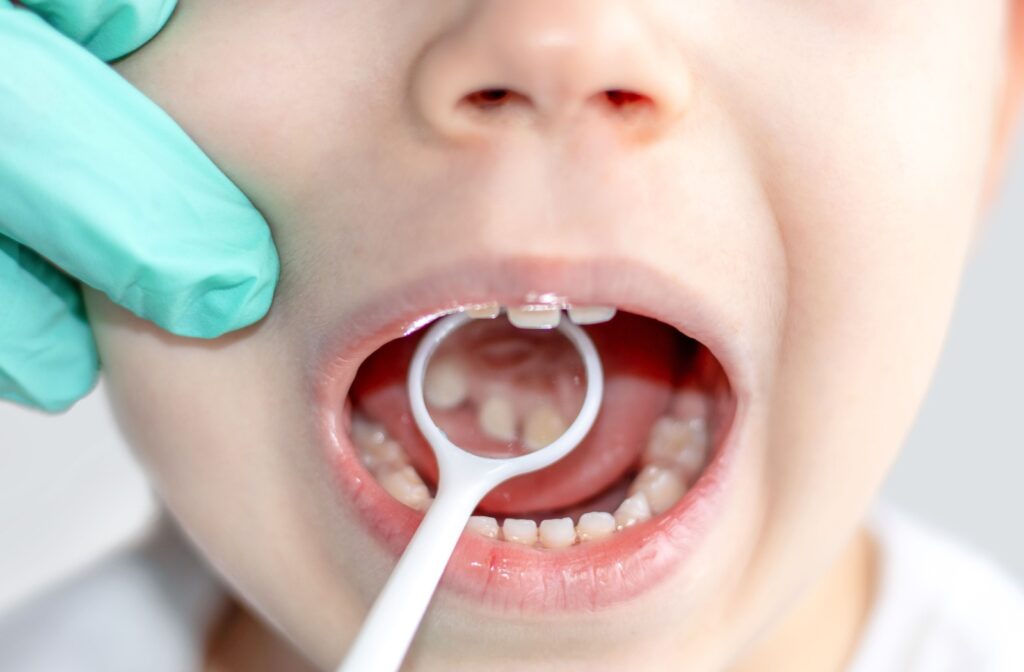
Cavities are a common concern—especially for parents managing their child’s dental health. These can be uncomfortable, disruptive, and irritating. If left untreated, a cavity can lead to serious dental complications. But do cavities go away with time? Can they heal themselves?
In the earliest stages, the process of dental decay (that causes cavities) can be slowed or arrested, However, the guidance and help from your paediatric dentist is needed to monitor this closely. To effectively manage cavities in children, professional intervention, like fillings and dental crowns may be necessary.
With the help of a paediatric dentist, you can prevent your child’s cavity from worsening. Early care is the key to preventing future dental problems.
What Are Cavities?
Cavities are small holes in the teeth caused by tooth decay. They develop when tooth enamel—the hard outer layer of the teeth—is weakened or damaged.
This enamel is supposed to be a shield for your teeth. It protects the sensitive inner layer from bacteria and damage. However, it erodes over time due to acid exposure and bacterial buildup.
Though cavities may start small, they can quickly affect the general dental health, and eventually the overall health of the child. Dental decay will compromise the integrity of a tooth and worsen over time. If left untreated, a cavity can cause toothaches, infection, and even tooth loss.
How to Tell if a Child Has a Cavity
Cavities can be hard to recognize—especially in their earlier stages. However, you can typically recognize a cavity by:
- tooth sensitivity to hot, cold, or sweet foods
- visible holes or dark spots on teeth
- complaints of pain or discomfort when chewing
- swelling or redness around the gums
- bad breath that doesn’t go away
Regular dental check-ups are crucial for cavity detection. An experienced paediatric dentist can detect cavities before worse symptoms arise. However, why do cavities develop in the first place?
What Causes Cavities?
Cavities occur when bacteria begin wearing down the protective enamel on the teeth. These bacteria feed on food debris, mostly sugar and starch, and release acids as a byproduct. Plaque—a sticky film of bacteria—coats the teeth, trapping food particles and allowing acid to attack.
Cavities are extremely common. They tend to develop due to factors such as:
- poor oral hygiene
- frequent consumption of sugary foods and drinks
- lack of fluoride
- dry mouth conditions
- certain medical conditions
It helps to reduce exposure to these factors whenever possible. With consistent oral care, you can significantly lower your child’s risk of cavities.
Do Cavities Go Away?
Teeth that have the early stages of dental decay, may not need intervention if assessed early and preventative measures are used. If your child regularly brushes and flosses, the dental decay may not spread and their tooth may remain free from the need for interaction. In most cases, rare, dental decay or cavities typically worsen rather than improve.
If there are visible pits, like little black or white spots on the tooth, the enamel is compromised. Bacteria thrive in these little holes, and cause more breakdown if the tooth.
If the damage to the enamel is severe enough, professional support is the only approach. Without quick dental care, the cavity will worsen. It can reach deeper parts of the tooth and cause worse symptoms.
If you suspect your child has a cavity, visit an experienced dentist as soon as you can. Cavities are can be easy to treat in their earlier stages, and preventive measures can make a significant difference.
How to Treat Cavities
Treating cavities is often easier than most people think. Professional treatment helps protect the integrity of the tooth and prevent future problems. With the help of a paediatric dentist, your child can enjoy a strong, healthy smile again.
Typically, there are 2 approaches here: fillings and crowns.

Fillings
Fillings are the most common method for treating small cavities. This involves removing the decayed portion of the tooth, cleaning the surrounding area, and then filling the tooth with a compatible material. Fillings are made of a safe, durable material to restore strength and function to a weaker tooth.
By sealing the tooth from further decay, fillings protect the tooth from future harm. This stops bacteria from reaching the deep, sensitive layers of a tooth. They also restore the tooth to its natural appearance and function. If children do not floss or brush well, or continue to eat a diet high in sugar, the filings may be to be retreated at some point. Dental decay can develop around the existing filling if not kept clean. Children that drink sugary drinks can compromise the success of their dental fillings.
Crowns
When a cavity is too large for a filling, a crown may be recommended. Crowns are made from durable materials and cover the entire tooth to protect it from further damage.
This approach is particularly useful when the damage is severe, or the tooth has some type of enamel defect. If the tooth is compromised to the point where it can’t support a filling effectively, a crown is often the best solution. Crowns allow children to eat, chew, and speak without pain or discomfort. They’re a popular option designed for extensive decay.
Tips for Preventing Cavities in Children
Preventing cavities requires a proactive approach. Proper oral hygiene is key, and fortunately, this is easy to introduce early on!
Some effective tips for preventing cavities include:
- using fluoride toothpaste
- flossing every day
- avoiding excessive consumption of sugary drinks
- encouraging a balanced diet rich in fruits, vegetables, and dairy
- limiting sticky snacks that can cling to teeth
- drinking plenty of water to help wash away food particles and bacteria
- consider using a fluoride rinse
Consistency is key when it comes to oral health. Remember—regular dental visits are just as important as proper dental care. With the help of your dentist, you can support your child in their journey to better oral health, and teach them to effectively prevent cavities in the future.
Dealing With a Cavity? We Can Help
Cavities should never be left untreated. They can significantly affect your child’s future oral health, but our team at The Children’s Dental Centre is here to help.
Contact our team today to book your child’s next dental exam. We can examine their teeth, give personalized advice to keeping them healthy, and work closely with you to keep their smile bright and strong.
Book an appointment with us today—together, we can protect your child’s future smile, just like they deserve.

